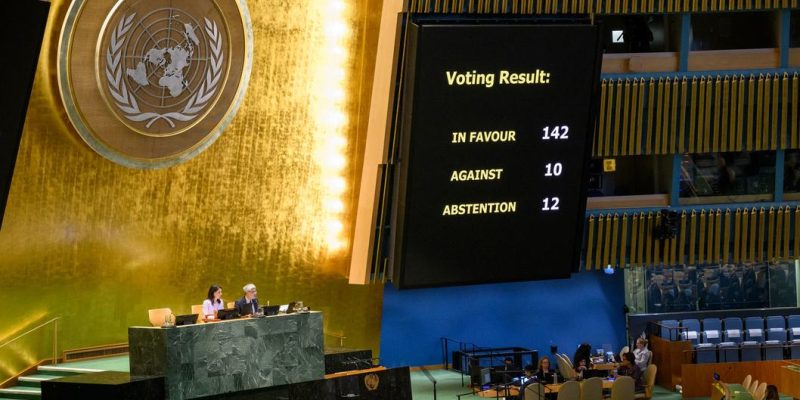Guerre à Gaza | Au cœur du plan américain pour l’après-guerre
— Permalien
L’armée israélienne a lancé hier des opérations militaires terrestres dans la capitale de la Bande de Gaza, qu’elle considère comme un bastion du Hamas.
L’assaut a été donné après le départ d’Israël du ministre des affaires étrangères américain, Marco Rubio, qui a réitéré que l’État juif avait le soutien «indéfectible» des États-Unis.
Cette attaque a été condamnée par de nombreux pays et organisations internationales.
Accusations de génocide
Une commission d’enquête de l’ONU a affirmé hier dans un rapport qu’Israël était en train de commettre un«génocide» contre les Palestiniens.
[L'article Israël mène une offensive majeure dans la ville de Gaza a d'abord été publié dans InfoBref.]


© Saher Alghorra for The New York Times


© Mahmoud Illean/Associated Press


© Tore Kristiansen/EPA, via Shutterstock


© Mahmoud Illean/Associated Press


© Agence France-Presse — Getty Images


© Amir Cohen/Reuters


© Menahem Kahana/Agence France-Presse — Getty Images


© Amir Cohen/Reuters


© Saher Alghorra for The New York Times

© Amir Cohen/Reuters


© Nathan Howard/Reuters


© Saher Alghorra for The New York Times


© Menahem Kahana/Agence France-Presse — Getty Images


© Qatar News Agency


L’Assemblée générale des Nations Unies a adopté une déclaration qui soutient la solution dite «à deux États» – Israël et une Palestine indépendante.
Une Palestine sans le Hamas
La déclaration affirme que le mouvement palestinien devra cesser d’exercer son autorité sur la bande de Gaza.
Le Canada et d’autres pays se sont engagés à reconnaitre l’État de Palestine.
[L'article La grande majorité des pays soutiennent officiellement la création d’un État palestinien a d'abord été publié dans InfoBref.]


© Pool photo by Nathan Howard


© Agence France-Presse — Getty Images


© Haiyun Jiang for The New York Times


© Haiyun Jiang for The New York Times


Israel and Ukraine have unveiled a joint security operation to safeguard tens of thousands of Jewish worshipers traveling to Uman for Rosh Hashanah, The Jerusalem Post reports. The operation is designed to protect pilgrims despite the ongoing Russian war and rising missile and drone strikes.
On 11 September, Israel’s Minister of National Security Itamar Ben-Gvir announced the plan after hosting Ukrainian Ambassador Yevhen Korniichuk, Israeli security officials, and representatives of the Haredi Orthodox community in Jerusalem on 10 September.
The mission also includes medical teams and coordination with Ukraine’s Chief Rabbi, Moshe Reuven Azman. His teams will be stationed at border crossings and on the ground to support worshippers during the holiday.
“The State of Israel places supreme importance on the safety of travelers,” Ben-Gvir said.
He welcomed the cooperation with Ukraine, calling it an “unprecedented operation” to ensure a safe and joyful pilgrimage.
Ambassador Korniichuk stressed Ukraine’s commitment despite wartime conditions.
“Ukraine, despite the burden of the Russian war and the severe security situation on the ground, is committed to holding a safe and respectful event in close cooperation with Israel,” he said.
Rabbi Azman praised the coordination, saying he welcomed the effort “to ensure that every worshipper can arrive with peace of mind and complete safety.”
Since the 1990s, Israeli pilgrims have made up the largest group attending Uman for Rosh Hashanah, with tens of thousands traveling annually. Many arrive through organized groups that manage logistics in coordination with Ukrainian authorities and local volunteers. In July, Ukraine declared Rabbi Nachman’s grave a national heritage site.


© Eduardo Munoz/Reuters


© Elizabeth Frantz for The New York Times


© Elizabeth Frantz for The New York Times


© Ansar Allah Media Office, via Associated Press


© Associated Press


© Doug Mills/The New York Times


© Ibraheem Abu Mustafa/Reuters
L’armée israélienne a bombardé Doha, la capitale du Qatar, dans le but d’y exécuter des dirigeants du Hamas.
Le premier ministre israélien Benyamin Nétanyahou a dit qu’il avait ordonné cette attaque à la suite d’une fusillade à Jérusalem revendiquée par le Hamas.
L’attaque israélienne au Qatar a été condamnée par de nombreux pays.
Mark Carney l’a qualifié d’«expansion inacceptable de la violence» et d’«affront à la souveraineté du Qatar».
[L'article Israël a pour la première fois mené une attaque au Qatar a d'abord été publié dans InfoBref.]


© Jacqueline Penney/Agence France-Presse — Getty Images


© Ahmad Mohamad/Agence France-Presse — Getty Images


© Ibraheem Abu Mustafa/Reuters


© Omar Al-Qattaa/Agence France-Presse — Getty Images


© Jihed Abidellaoui/Reuters


© Abir Sultan/EPA, via Shutterstock




© Carlos Jasso/Reuters


© Saher Alghorra for The New York Times


© The New York Times




© Saher Alghorra for The New York Times


© Hassan Ammar/Associated Press


© Hassan Ammar/Associated Press


© Caroline Gutman for The New York Times


© Amir Levy/Getty Images